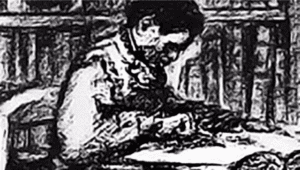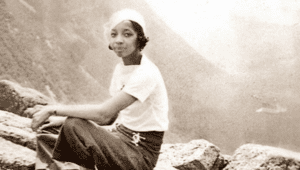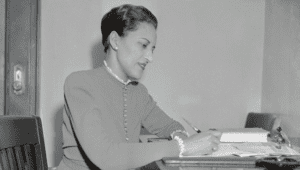Trailblazing is not a phase
In the United Kingdom, fewer than 3% of all lawyers are Black according to the Solicitors Regulation Authority, with an even smaller percentage of lawyers being Black women. This is a shocking statistic given the historical legacy left by so many Black women in law.
In honour of Black History Month, we pay homage to 4 Black women who have left an incredible legacy in the legal profession and paved the way for future Black women in law.
Charlotte Ray: the first stand
Charlotte Ray (1850 – 1911) was the first of many legal trailblazers for Black women, becoming the first African American female lawyer to practice law in the United States, after having graduated from Howard University. Ray demonstrated her determination to overcome countless obstacles, such as racial discrimination and gender inequality, by becoming the first female admitted to the District of Columbia Bar and being the first woman admitted to practice before the Supreme Court of the District of Columbia. Ray’s tenacity encouraged women in other states to fight to be called to the bar and so led to her becoming a role model for African American women in law.
Standing together
It is also worth noting that Ray was recognised for her activism in the women’s suffrage movement as part of the National Women Suffrage Association. She continued to push for equality for women of ‘colour’ and for them to be able to achieve legal status. Due to this she became heavily involved in the National Association of Coloured Women.
Dorothy Crockett: the rise…
Like her predecessors, Dorothy Crockett (1910 – 1955) paved a path for Black women in law by becoming the first Black woman and seventh overall to practise law in Rhode Island. News of her success hit the front pages with The Boston Chronicle stating that Crockett was “one of the few women of any race entitled to practise law in the state.”. Crockett was the last woman admitted to the state’s bar in the 1930s, with Rhode Island’s 8th female lawyer only being sworn in almost a decade later. There were also no other African American women who joined the bar again until the 1970s.
…and the fall
Despite her notable accomplishments, Crockett was subjected to racism and sexism throughout her legal career. By 1940 she had moved to California after marrying Irving Bartleson and, in spite of her experience and education, began work as a maid. There is no evidence that Crockett ever practised law in California or tried to take the bar exam. Sadly, this was the norm during such times, with records revealing that the first black woman admitted to the bar in California, in 1929, could not find legal employment until 1939.
Jane Bolin: leaving a legacy
Jane Bolin (1908 – 2007) made history in 1939, being the first Black woman to become a judge in the United States – she was appointed to the New York City Domestic Relations Court by Mayor LaGuardia. Bolin first recognised her passion for advocacy and social justice as a child when she found herself fascinated by her father’s (Gaius C. Bolin, a renowned Black lawyer) law office. She went on to attend Wellesley College, being one of only two Black students in her class. Her aspirations led her to consider applying to Yale Law School, despite being discouraged by a career adviser at Wellesley due to her gender and race. This was just one of the many instances of discrimination she experienced throughout her time at Wellesley.
Finding strength in adversity
Nevertheless, Bolin persevered and gained a Juris Doctor degree from Yale Law School in 1931. It was during these early years that she set the pace of her trailblazing approach by being one of just three women in her class and more notably, the first Black woman to earn a law degree from Yale Law School. Once sworn in as the first African American female judge in the United States, Bolin led a very successful career, serving on the Family Court bench for 40 years and advocating for children and families via outside institutions as well.
Michelle Obama: the first of many
In 2008, Michelle Obama made history by becoming the first African American First Lady of the United States. It was at Harvard Law School, in 1988, that Obama first began her legal career after receiving her a Juris Doctor degree. Serving in both public and private office in Chicago, Illinois, Obama established a reputable career before becoming First Lady. She began work as the assistant commissioner for the Chicago Department of Planning and Development before founding the Chicago branch of Public Allies. During this period, she also served in many high-level positions at the University of Chicago, including Vice President of community and external affairs for the University of Chicago Medical Centre.
Becoming a role model
Throughout her career, Obama has not only become a role model for African American women, but is also an advocate for women, young people and families too. Voted as one of the most influential and admired women in history by numerous organisations, Obama represents the opportunities and experiences Black women in law have fought over centuries to achieve, demonstrating the cultural progression in society.
The evolution: how much further?
While these trailblazer women, and many other women, have used their courage and determination to pave the way for future generations of legal professionals, there is still an undeniable lack of representation within the sector.
The Obelisk Support solution
Here at Obelisk Support, we take pride in our innovative approach to championing new ways of working. With the vision to make legal work more inclusive and allow accomplished legal professionals to thrive throughout their career – Obelisk Support created a different model to deliver legal work, connecting clients with skilled consultants who work flexibly. This required a change of mind set and approach, which is what Obelisk has successfully focused on, pioneering flexible and remote working arrangements long before they were mainstream. Today, the model includes all lawyers who want to work differently, with over 2,000 consultants now registered.
Obelisk Support is founded on and continues to honour the principle of #HumanFirst. We set ourselves apart through our commitment to putting people first and focusing on what our clients and consultants really need to succeed. Today we continue to be a vocal champion of cultural change in the legal profession to build a future-facing profession where all lawyers have true equality of both opportunity and outcome.



